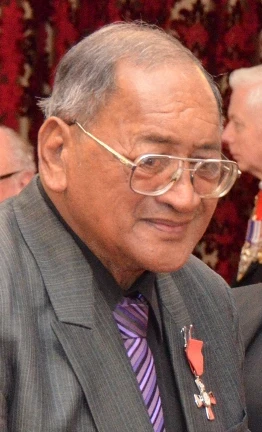Te Wiki o te Reo Māori 2023: Whakanuia te mahi tā Morvin Simon: kia kaha te reo Māori
Morvin Simon, 1944-2014
Te Āti-Haunui-a-Pāpārangi, Ngāti Apa, Ngāti Tuwharetoa
b. Kaiwhaiki Marae, Whanganui River
Composer, kapa haka leader, choirmaster and historian

Morvin Simon MNZM, 1944-2014. CC BY 4.0, via Wikimedia Commons and the Governor-General/Government House website
In this Te Wiki o te Reo Māori, let’s remember the special team of Morvin and Kura Simon, who gave a life’s partnership to sustaining Te Reo Māori and enhancing Māori performing arts:
Morvin composed many waiata including our workplace favourite: (Te Aroha 1983) – so simple and yet so beautiful but he composed many other waiata such as:
His wife Kura was his pou for the last seven years of Morvin’s chronic ill-health. Kapa haka is a wonderful way of promoting te reo and they brought aroha and whanaungatanga to the lives of rōpū such as Te Matapihi, and Te Taikura o te Awa Tupua.
Together, in 2013, they were awarded Queen’s Birthday honours – Morvin as Member of the New Zealand Order of Merit, and Kura as Queen’s Service Medal , for their services to Māori.
In the previous year, 2012, Morvin received an honorary Bachelor of Arts (Māori Performing Arts) from Te Wānanga o Awanuiārangi.
Our library has copies of Morvin’s history of pā of Whanganui – Taku Whare e! but his tuhituhinga included:
Te Kohanga reo, he ahurewa mana = A language nursery, seedbed of dignity (1990)
1946-1996 Hui Aranga : “Te Aranga Ake” = “The Resurrection” (1996)
He whakaaro hei korero (1991)
and a section of Te Wharekura. 46: Te Taonga nei o te tikanga.